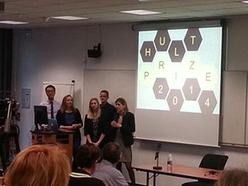Two HEC Paris students start-ups presented to the Collège des Directeurs du Développement Durable (C3D)
For almost six months, students of the MSc in Sustainable Development at HEC have built a database of fifty business models, for the “Innovative Business Model " class, taken by Laurence Lehmann Ortega. All of these structures have one thing in common: they generate profit whilst having a positive impact on their ecosystems.
For almost six months, students of the MSc in Sustainable Development at HEC have built a database of fifty business models, for the “Innovative Business Model " class, taken by Laurence Lehmann Ortega. All of these structures have one thing in common: they generate profit whilst having a positive impact on their ecosystems.

These new companies are inspired amongst other concepts, as belonging to a collaborative and circular economy.
Of these fifty projects, ten were selected and presented to the Collège des Directeurs du Développement Durable (C3D) on Tuesday 1st April. The conference was organized by Bénédicte Faivre- Tavignot , Master Director, and Social Business/Enterprise & Poverty Chair Director.
Ten models were presented: eight are existing businesses, and the remaining two are start-ups created by the students. Fabrice Bonnifet, Director of Sustainable Development at Bouygues and Vice President of C3D, opened the ceremony celebrating this exchange between students and professionals. The thirty-eight Master students present, come from more than eighteen countries spanning five continents, which provides this class with a highly stimulating diversity.
The first model came from Germany. The concept is simple: teach blind women to detect breast cancer using their highly developed sense of touch. In addition to allowing these women to better integrate into society, it also offers patients a service which is often cheaper, with better detection results.
Kelsey and Jenna, two Americans, then introduced a new system combining fish - farming in a closed production cycle: an urban aquaponic farm. This start-up began on HEC campus, and has already won an entrepreneurial competition at Paris-Saclay.
The final model; BeeHealthy, was the regional winner of a competition held in London which was sponsored by Bill Clinton: the Hult Prize. Students of this team had made an astonishing discovery: there is a relatively simple system to allow bees to detect diabetes in patients, by blowing in a glass bubble. It is both fast and efficient with a 97% success rate. Their idea; develop this innovation in areas most affected by this disease, and sell the honey and wax from the bees in Europe to finance the project.
The public has responded very positively to these various models which challenge the standard vision accepted by a linear economy which is rarely involved in social and environmental issues. At the end of the presentations, students and professionals gathered to "network" and discuss potential synergies. This was a great opportunity for students who will soon graduate.